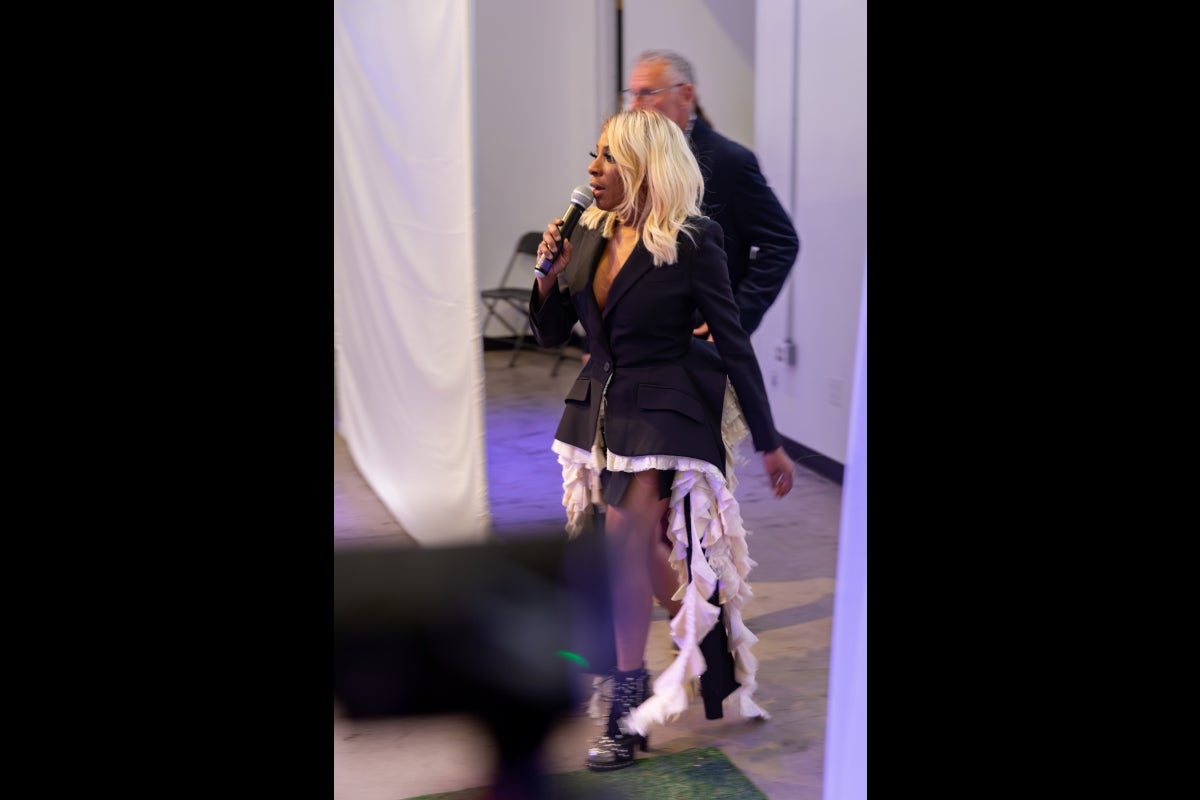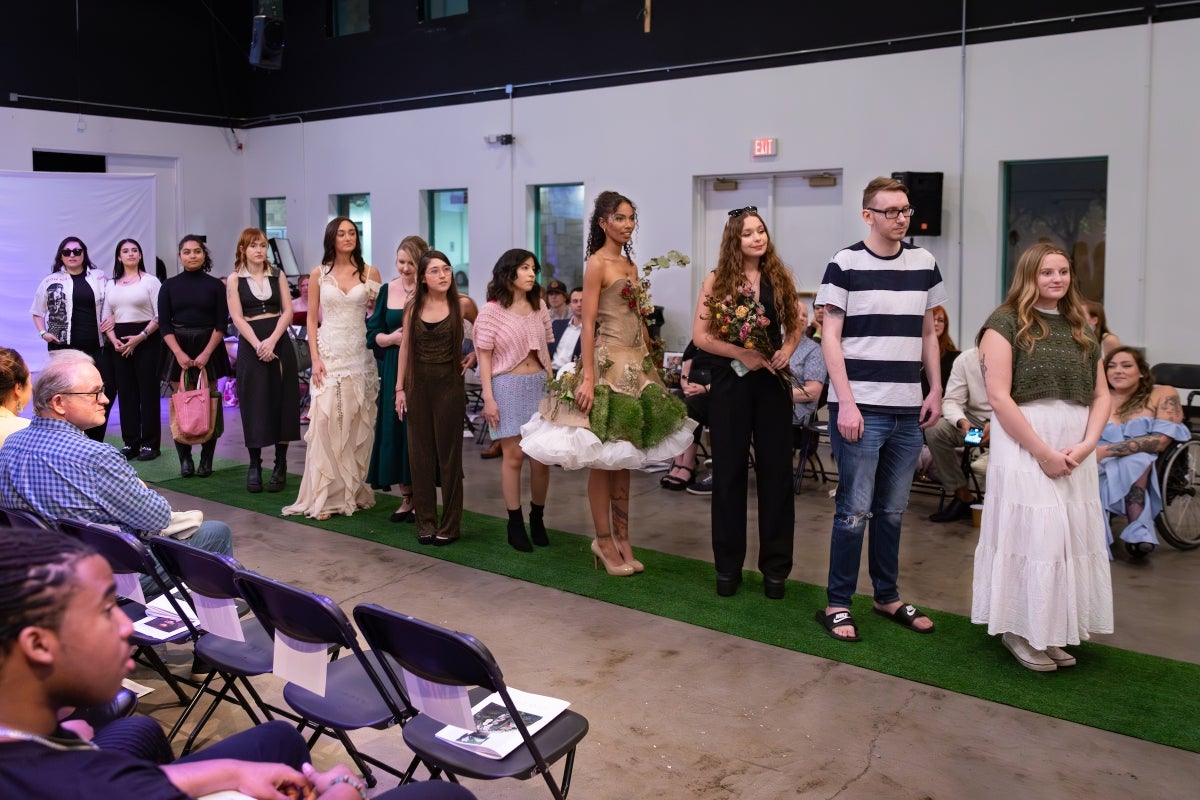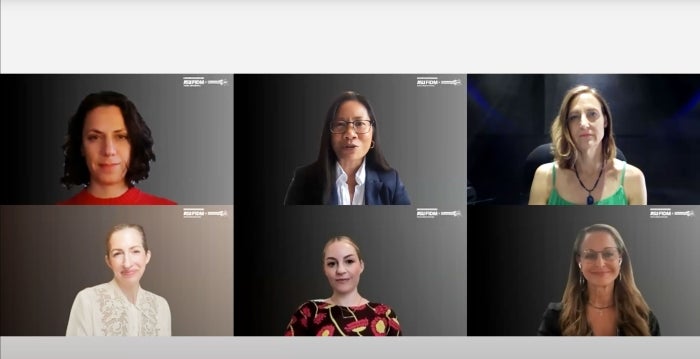'Living dress' wins Eco-Chic sustainable fashion contest

Model Amani Edmondson (center) wears a "living dress" created by fashion design major Elena Marshall (center left) at the Eco-Chic Design Contest and Showcase held in Tempe on April 19. The fashion show audience voted Marshall's design as the winner of the contest. Photo by EJ Hernandez/ASU News
When Elena Marshall is done showing off her award-winning “living dress,” she’ll bury it in her backyard.
The dress, a chic design with a strapless bodice and flouncy skirt, is made of recycled burlap and trimmed with real grass from chia seeds.
Marshall, a fashion design major at Arizona State University, won the Eco-Chic Design Contest and Showcase last Friday, a student-run event that featured sustainable fashion designs made by eight ASU students.
The show, complete with models, a runway and music, displayed sustainable fashion entries that included knitwear made with no waste, a dress made of vintage doilies and nonplastic vegan-leather bags.
Marshall’s “living dress,” which she sewed herself, was decorated with dried flowers that she collected from momentous occasions, such as her parents’ wedding and her graduation.
“It’s something I’ve been wanting to do for awhile and it’s so meaningful for me,” said Marshall, who won $1,000 in the contest.
“The dress is completely biodegradable so I can bury it outside when we’re done.”
The Eco-Chic Design Contest and Showcase was the final project of three students in the Sustainable Fashion Humanities Lab course this semester — Latrice Ciricillo and Mario Violi, both Italian studies majors, and Somaly Jaramillo Hurtado, a graduate student in sustainability.
The Humanities Lab at ASU is a center that offers semester-long courses in which students research and address complicated social issues in a transdisciplinary way.
The class, which had 34 students, divided into groups to research aspects of sustainable fashion and then create a response to the problem. Besides the fashion show, one of the other student projects was a webinar with top fashion experts.
The students learned how the fashion industry is a major contributor to water pollution, microplastics and exploitative labor practices, and how profit margins can affect sustainability efforts.
At the fashion show, the Humanities Lab students described the problem and one solution — designing beautiful clothing in a sustainable way that consumers want.
“It doesn’t have to be Birkenstocks and T-shirts,” Ciricillo said. “It can be elegant clothes that people want to buy.”
Sustainability as psychology
The webinar, held April 18, was organized by two Humanities Lab students: Jill Stein, who is pursuing a master’s degree in futures and design in the College of Global Futures with a focus on fashion innovation, and Vidit Sharma, who is pursuing a master’s degree in global management at the Thunderbird School of Global Management.
Watch webinar
Catch the Sustainable Fashion Panel on Youtube.
The panelists included top names in the world of sustainable fashion: Alysia Reiner, a sustainability activist and an actress who appeared in “Orange is the New Black;” Marci Zaroff, founder and CEO of ECOfashion Corp.; Silvia Camplone, senior product management manager for Ralph Lauren; Dorie Morales, publisher of Green Living Magazine; and Nina Farran, founder of Fashionkind. The moderator was Marcy Medina, the former West Coast bureau chief of Women's Wear Daily and a friend of Stein’s.
The panelists discussed how fashion consumption is a psychological issue.
“We’ve been taught, particularly as women, that we have to buy things to feel like we’re enough,” Reiner said.
“I’m continually trying to un-brainwash myself. One of the things I’m curious about is asking yourself, ‘Do I really think I need this thing and how do I think it’ll make me feel, and is there another way to feel that other than buying something?’”
Zaroff said that instead of sacrifice, sustainability has to be a “yes and” approach.
“It’s about giving people what they want, what they love, what they seek, what resonates for them. That’s the yes,” she said.
“Yes, and it’s also about fair trade and ethical manufacturing and regenerative and circular fibers and low-impact dyes and women’s empowerment. You’re not giving something up. You’re getting more.”
Camplone said that Ralph Lauren has set ambitious sustainability goals.
“The shift that is happening across the industry is in response to how much awareness is growing at the consumer level,” she said.
“The key goal is targeting to reduce greenhouse gas emissions by 30% by 2030. This year we were at 29%. Our cotton is coming from sustainable sources and so is our wool.
“We have been selecting new vendors and letting go of others.”
Farran said she sees a trend toward quality over quantity.
“If the clothes are more than just a transaction and they’re a quality garment, your psychology changes. You’re more inclined to repair it if it rips or to wear it multiple ways,” she said.
Morales said her magazine used storytelling to highlight sustainability in fashion.
“It’s also sharing your own story. I haven’t bought new clothes in years. I go to a clothing swap every year,” she said.
Stein has always been interested in design and fashion.
“I love the expressionism and the performative nature of fashion,” she said.
“It’s escapism as well — the dream and the fantasy.”
After finishing her master’s degree, Stein is considering going for a PhD and then working in the fashion industry to promote sustainability.
“I’m very interested in the business of fashion,” said Stein, who has run her own design firm for several years.
“It’s about creating marketplaces and moving the needle. How do we change society?”
Ciricillo had a career as a celebrity publicist before becoming an ASU student and she donated the $1,000 prize for the contest.
“I’ve always had a passion for fashion and I really wanted these students to put their best foot forward,” she said.
Through her publicity work, Ciricillo has forged friendships with several fashion designers and her closet is full of one-of-a-kind looks. So she decided to raid her own closet for the fashion show, which started with models showing the students’ designs for the contest and then, as the audience members voted on the winning entry, showed off Ciricillo’s pieces.
“I have a few Dolce & Gabbana pieces that are sustainable because they were made using remnants of materials,” she said.
“There’s a common misconception that if it’s sustainable, it will be ugly or won’t last, and it doesn’t have to be that.”
Video by EJ Hernandez/ASU News
Courses in the Humanities Lab are typically not repeated, but sustainable fashion has been so popular that this was the third time it was offered, according to the lab’s co-directors, Heather Switzer, an associate professor of women and gender studies, and Juliann Vitullo, an associate professor of Italian.
The lab offers several courses per semester. The others for spring 2024 are “Diplomacy Lab Brazil,” “Ethics of Language Testing,” “Guns, Art-making and Truth” and “Intro to Interdisciplinary Research.”
The course topics are wide ranging and use the humanities as a lens to explore complicated issues.
“We’ve had a series of labs in which students are able to work with community groups and really listen to what those communities need and try to help them develop solutions,” Vitullo said.
In fall 2022, lab students worked with teens at Maryvale High School and created an event called “Avanzando,” in which the high schoolers were bused to the Tempe campus to learn about applying for college.
The Sustainable Fashion course was co-taught by Enrico Minardi, an associate teaching professor of Italian in the School of International Letters and Cultures, and Jessica Kosak, an instructor for ASU FIDM.
“All the courses are co-taught and there's always one professor from the humanities with the idea that questions of history, culture and ethics are important in terms of addressing any social challenge,” Vitullo said.
Switzer said that the courses take many months to develop with the faculty.
“We have a syllabus template that helps faculty organize their thinking about the class in different ways,” she said.
“There are no tests and assessments in a conventional sense.”
Students spend the first part of the semester researching the issue and hearing from experts. For example, in a lab that focused on energy and social justice and addressed the closure of the Navajo coal-generating station in northern Arizona, students met with people from the Navajo Nation and the Salt River Project as well as a historian.
ASU librarians are embedded in the courses to help students shape their questions.
Then, either working together as a class or divided into groups, students decide what the final deliverable will be.
Humanities Lab projects have resulted in public events, like this semester’s fashion show and webinar, or outreach such as a social media campaign, podcast, zine, panel discussion, mural or a presentation to stakeholders.
“For the lab we're running this semester called Diplomacy Lab Brazil, the faculty went through a bidding process with the State Department and identified some environmental and climate change-related issues in key cities in Brazil,” Switzer said.
Then faculty and students traveled to Washington, D.C., to present their research to the State Department.
In fall 2020, Switzer co-taught a lab with Annika Mann, an associate professor in the School of Humanities, Arts and Cultural Studies who is a scholar of disability studies. In that lab, the students worked with people from Enterprise Technology and the university’s ADA compliance officer to update the interactive ASU map with a layer showing accessible bathrooms, doorways and elevators.
Students can also apply to continue their project through the Beyond the Lab program, and can apply for a $5,000 grant to deepen their impact.
Humanities Lab students range from first-year undergraduates to PhD students.
“Students are registering for these courses because they have a real interest in the topic," Vitullo said. "They're coming from very different degree programs but they're all very engaged in the challenge and I think that's really the magic of it.”
More Arts, humanities and education

Behind the curtain: Discovering careers in the arts at ASU Gammage
For a group of students from Sunnyslope High School, Eastmark High School and AZ Teen Homeschool Co-op, a recent December day at ASU Gammage became much more than just a field trip. It became an eye-…

Honoring a legacy of cultural education, exploration
Belle Edson has inspired countless students to expand their horizons during her 26-year tenure at Arizona State University. A beloved professor and director of undergraduate studies and core courses…

School of Social Work’s ‘keepin’ it REAL’ substance use prevention program to expand across Sonora this spring
More than 7,000 seventh graders in the Mexican state of Sonora will enroll this spring in an Arizona State University program that has been teaching how to prevent substance use to thousands of…




